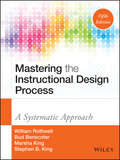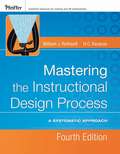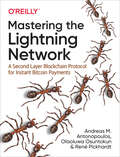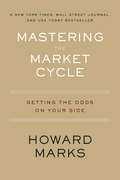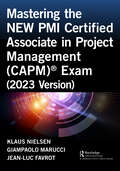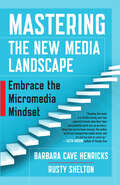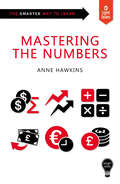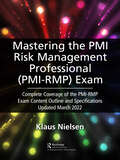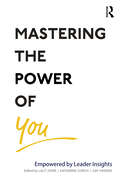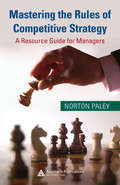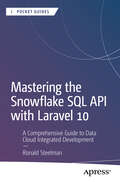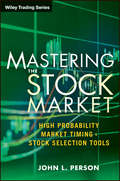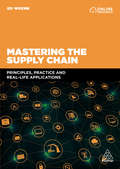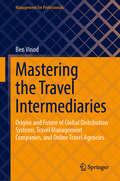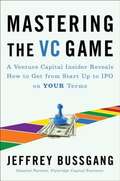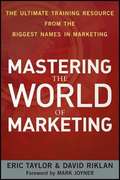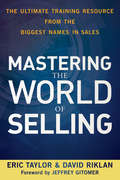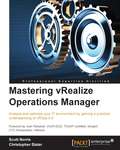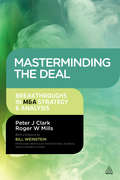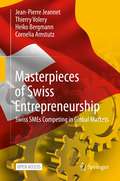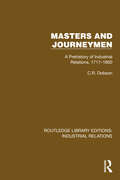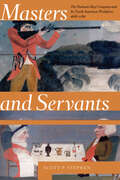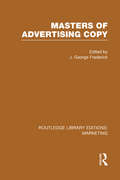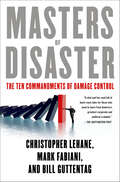- Table View
- List View
Mastering the Instructional Design Process
by William J. Rothwell Stephen B. King Bud Benscoter Marsha KingA comprehensive framework for effective real-world instructional design Mastering the Instructional Design Process provides step-by-step guidance on the design and development of an engaging, effective training program. The focus on core competencies of instructional system design helps you develop your skills in a way that's immediately applicable to real-world settings, and this newly updated fifth edition has been revised to reflect the new IBSTPI Competencies and Standards for Instructional Design. With a solid foundation of researched and validated standards, this invaluable guide provides useful insight and a flexible framework for approaching instructional design from a practical perspective. Coverage includes the full range of design considerations concerning the learners, objectives, setting, and more, and ancillaries include design templates, PowerPoint slides, lecture notes, and a test bank help you bring these competencies to the classroom. Instructional design is always evolving, and new trends are emerging to meet the ever-changing needs of learners and exploit the newest tools at our disposal. This book brings together the latest developments and the most effective best practices to give you a foolproof framework for successfully managing instructional design projects. Detect and solve human performance problems Analyze needs, learners, work settings, and work Establish performance objectives and measurements Deliver effective instruction in a variety of scenarios Effective training programs don't just happen. Instructional design is a complex field, and practitioners must be skilled in very specific areas to deliver a training program that engages learners and makes the learning 'stick.' Mastering the Instructional Design Process is a comprehensive handbook for developing the skillset that facilitates positive training outcomes.
Mastering the Instructional Design Process
by William J. Rothwell Kazanas H. C.The fourth edition of Mastering the Instructional Design Process has been completely revised and updated and is based on the instructional design competencies of the International Board of Standards of Performance and Instruction (IBSTPI). The book identifies the core competencies of instructional system design and presents them in a way that helps to develop these competencies and apply them successfully in real-world settings. This comprehensive resource covers the full range of topics for understanding and mastering the instructional design process including: detecting and solving human performance problems; analyzing needs, learners, work settings, and work; establishing performance objectives and performance measurements; delivering the instruction effectively; and managing instructional design projects successfully.
Mastering the Lightning Network: A Second Layer Blockchain Protocol for Instant Bitcoin Payments
by Andreas M. Antonopoulos Olaoluwa Osuntokun René PickhardtThe Lightning Network (LN) is a rapidly growing second-layer payment protocol that works on top of Bitcoin to provide near-instantaneous transactions between two parties. With this practical guide, authors Andreas M. Antonopoulos, Olaoluwa Osuntokun, and Rene Pickhardt explain how this advancement will enable the next level of scale for Bitcoin, increasing speed and privacy while reducing fees.Ideal for developers, systems architects, investors, and entrepreneurs looking to gain a better understanding of LN, this book demonstrates why experts consider LN a critical solution to Bitcoin's scalability problem. You'll learn how LN has the potential to support far more transactions than today's financial networks.This book examines:How the Lightning Network addresses the challenge of blockchain scalingThe Basis of Lightning Technology (BOLT) standards documentsThe five layers of the Lightning Network Protocol SuiteLN basics, including wallets, nodes, and how to operate oneLightning payment channels, onion routing, and gossip protocolFinding paths across payment channels to transport Bitcoin off-chain from sender to recipient
Mastering the Market Cycle: Getting the Odds on Your Side
by Howard MarksA NEW YORK TIMES, WALL STREET JOURNAL, AND USA TODAY BESTSELLERNamed one of the Best Business Books of 2018 by Business InsiderThe legendary investor shows how to identify and master the cycles that govern the markets.We all know markets rise and fall, but when should you pull out, and when should you stay in? The answer is never black or white, but is best reached through a keen understanding of the reasons behind the rhythm of cycles. Confidence about where we are in a cycle comes when you learn the patterns of ups and downs that influence not just economics, markets and companies, but also human psychology and the investing behaviors that result. If you study past cycles, understand their origins and remain alert for the next one, you will become keenly attuned to the investment environment as it changes. You’ll be aware and prepared while others get blindsided by unexpected events or fall victim to emotions like fear and greed. By following Marks’s insights — drawn in part from his iconic memos over the years to Oaktree’s clients — you can master these recurring patterns to have the opportunity to improve your results.
Mastering the Media: Make It Your Story
by Richard LueckeCommunication is an important instrument for change in times of crisis. To frame a crisis properly through media outlets for the general public's consumption is important following the resolution phase in crisis management. This chapter deals with damage control, offering suggestions for communicating through the media in the most effective and positive way.
Mastering the NEW PMI Certified Associate in Project Management (CAPM)® Exam (2023 Version)
by Klaus Nielsen Giampaolo Marucci Jean-Luc FavrotProject Management Institute (PMI) is the leading professional association for project management, and the authority for a growing global community of millions of project professionals and individuals who use project management skills. PMI offers several certifications in the areas of project management, risk management, and other related areas. The Certified Associate in Project Management (CAPM®) is one credential offered by the Project Management Institute (PMI). The CAPM® is an entry-level certification for project practitioners. Designed for those with less project experience, the CAPM® is intended to demonstrate candidates’ understanding of the fundamental knowledge, terminology, and processes of effective project management. This certification is a popular prerequisite that helps employers find the professionals most suited to fulfill specific roles in their organizations. Most study guides just explain the contents of the exam without providing tools to maximize learning. The authors, as authorized training partners with PMI, translate the new 2023 examination content outline into what exam takers need to do and know in preparation for the exam. It also provides them with exercises and prep questions as a quick and easy check to ensure they are on the right path in preparation for the exam, thus maximizing their chance of passing.
Mastering the New Media Landscape: Embrace the Micromedia Mindset
by Rusty Shelton Barbara Cave HenricksThe New Way to Get Noticed The giant brands that once dominated the media landscape—Oprah, the New York Times, NPR, CNN—have seen their monopoly on public attention smashed by the Internet and now find themselves competing with individuals and brands in a sea of micromedia: websites, social media, blogs, podcasts, and more. Ace publicists and marketers Barbara Cave Henricks and Rusty Shelton show that to navigate through this modern terrain, you need to think more like a media executive than a marketer. The key lies in mastering three crucial categories of media—earned, owned, and rented—and knowing how to integrate each for maximum success. By using this proven strategy, you can create a positive feedback loop that will generate massive momentum and grow a large, loyal audience for your message.
Mastering the Numbers: Smart Skills (Smart Skills)
by Anne HawkinsA practical and accessible guide to the numerical skills needed to excel in business <P><P> Whatever your business or technical background, having a sound grasp of finance empowers you to make more informed and confident strategic and operational decisions. Those with a good understanding are also more likely to be involved in strategically important projects, facilitating career advancement or any role where scrutiny of budgets or contracts is required. <P><P> This book is designed to give any professional from a non-financial background the skills and confidence to add that critical financial dimension to their skillset. <P><P> Quickly and accurately read and interpret accounts, including forecasts, balance sheets and profit and loss reports <P><P> Understand the difference between revenue, profit, cash flow, overhead and margin to make better financial decisions and produce budgets and forecasts with confidence <P><P> Effectively communicate financial performance to your management or employees <P><P> Whether you are an entrepreneur with a great business idea but no idea how to explain your plans to potential investors, or a marketing professional hoping to understand accounting jargon in your financial reports, this Smart Skills guide can give you the skills and knowledge you need to succeed in business, with no need for an expensive or lengthy course in finance.
Mastering the PMI Risk Management Professional: Complete Coverage of the PMI-RMP Exam Content Outline and Specifications Updated March 2022 (Basics Lean® Implementation Ser.)
by Klaus NielsenRisk Management Professionals seek to identify, analyze, and document the risks associated with a company’s business operations, as well as monitor the effectiveness of risk management processes and implement needed changes. The PMI Risk Management Professional (PMI-RMP)® certification not only highlights the ability to identify and assess project risks, mitigate threats, and capitalize on opportunities, but it also enhances and protects the needs of the organization. Gaining distinction as a PMI-RMP sets the Risk Management Professional apart from other professionals and brings credit to an organization. The exams from the Project Management Institute are not easy, so whether you are running a course as an instructor or studying by yourself, you need a good study guide to maximize time spent studying and one which enhances the chances of passing the exam. Test takers sitting for the exam need a study guide that suggests which study materials are best to read in preparation for the exam, presents exercises to enhance learning and understanding, and provides sample exam questions. Most study guides just explain the contents of the exam without providing the tools to maximize learning. Klaus Nielsen, an Authorized Training Partner with PMI, translates the PMI examination content outline for April 2022 into what people need to do and know in preparation and provides them with exercises and prep questions as a quick and easy check to ensure they are on the right path in preparation for taking the exam. This book helps maximize the chance of passing the exam.
Mastering the Power of You: Empowered by Leader Insights
by Gay Haskins Lalit Johri Katherine CorichThe world of the 2020s is complex and demanding. We are faced with a myriad of difficult decisions about our present and future, driven by the impact of the COVID-19 pandemic, the economic downturn, rising unemployment and inequalities, digital disruption, uncertain political environments, and climate change. In this book, leaders from around the world share their experiences in adapting to the changing world and the lessons they have learnt. They offer advice on mastering a diverse range of leadership concepts, skills, and behaviours to prepare for the challenges of the 21st century. The easy-to-follow format is grouped around the core concepts of Leadership, entrepreneurship, and volunteering; Purpose and values; Authenticity, trust and presence; Strategising, thinking, and decision-making; Mentoring and development; Mental resilience; Diversity and inclusion; Negotiating and collaborating; and Social and environmental impact. Each of the 32 chapters takes you on a voyage of discovery to a wide range of "powers" and inspires you to use them to open new opportunities in your life and workplace. If you are a recent graduate aspiring to gain meaningful employment in a rapidly transforming workplace, or a mid-career professional whose job may soon change or disappear with increasing automation, this book is for you. If you are a consultant, coach, mentor, or trainer, looking for new approaches, this book will provide valuable guidelines. If you are a seasoned professional navigating the new norms, this book will give you many inspiring insights.
Mastering the Rules of Competitive Strategy: A Resource Guide for Managers
by Norton PaleyThe stakes are high and real. Money is spent. Personnel are committed in a battle for the triumph or downfall of a company. Yet, given the same circumstances, some companies continue to thrive while others wash out and become also-rans. In the end, it is the dynamics of the competitive marketplace, the quality of the organization‘s business plan, a
Mastering the Snowflake SQL API with Laravel 10: A Comprehensive Guide to Data Cloud Integrated Development (Apress Pocket Guides)
by Ronald SteelmanThis book is your essential guide to mastering Snowflake’s SQL API, offering a comprehensive understanding of this powerful tool. In today’s data-driven world, robust, flexible, and scalable solutions are crucial, and Snowflake’s Data Cloud platform is a game-changer in cloud data warehousing and analytics. The book includes examples using both Snowflake and the Laravel PHP Framework, assuming basic knowledge of SQL and Laravel. Key topics include SQL API development, SQL basics, advanced techniques, data security, performance tuning, best practices for data warehousing, integrations, real-world use cases, future trends in data analytics, and leveraging PHP in Laravel for dynamic web applications. This book equips you with the skills to unlock insights, make data-driven decisions, and stay ahead in your industry. Whether you’re aiming to advance your career, enhance your organization’s data infrastructure, or confidently make data-driven decisions, Mastering Snowflake SQL API with Laravel 10 is a must-have resource for excelling in integrated data analytics and cloud data warehousing. What You Will Learn Master SQL fundamentals and advanced techniques Explore data loading, security, and performance optimization Keep up-to-date on best practices for efficient data warehousing Gain insights into real-word use cases Prepare for future Snowflake and data innovations Who This Book is For Data professionals, IT managers, business executives, students, and data enthusiasts.
Mastering the Stock Market
by John L. PersonNoted technical analyst John Person outlines a comprehensive method to pinpointing today's best trading opportunitiesThe economy and stock market are heavily influenced by seasonal factors. For example, a strong holiday buying season tends to be bullish for retail stocks or rising energy costs hurt airline profitability. Awareness of seasonal trends in both the economy and stock market can put you in a better position to profit from sectors and stocks that are likely to outperform the overall market. And technical tools can then be used to confirm emerging trends and time entries into these stocks and sectors.Mastering the Stock Market provides authoritative insights into a method for trading stocks based on seasonal trends, sector analysis, and market timing. Taking a top-down approach, the book explains how seasonal supply/demand forces impact commodities and different sectors of the stock market. After learning how to identify stock market sectors and commodity ETFs that are ripe for a big move, you'll quickly discover how to use technical analysis to gauge the strength of the sector or commodity and then identify the strongest stocks and ETFs to trade. Along the way, you'll also learn how to use the author's own indicators, Persons Pivots, to identify support/resistance areas and pinpoint optimal entry and exit points.Outlines a proven technical approach for trading stocks based on seasonal trends, sector analysis, and market timingBreaks new ground in comparative relative strength, trading volume, breadth indicators, and utilizing pivot analysis in conjunction with options expiration days to identify trading opportunitiesWritten by noted technical analyst John L. PersonTo successfully trade today's markets you need to use a proven approach and have the discipline to effectively implement it. Mastering the Stock Market has what you need to achieve these goals and capture consistent profits along the way.
Mastering the Supply Chain: Principles, Practice and Real-Life Applications
by Ed WeenkMastering the Supply Chain is an introduction to supply chain management. The book integrates theory with practice and aims to create a cross-functional mindset in students and practitioners. It provides a wide overview of relevant supply chain concepts and sets out the challenges that need to be overcome in order to find practical ways of implementing these in a real company situation. Readers are continuously asked to actively reflect on the choices they make, thus experiencing first-hand the many challenges that good and effective supply chain management presents. Mastering the Supply Chain presents a different way of learning that puts the reader at the heart of a life-like situation, so that they experience the impact of every decision they make, not just in their own 'silo' but across the business. In this way, they will learn that many supply chain concepts are relatively simple to understand, but not so easy to apply in reality. Chapter 6 helps students to pull everything they've learned together and see how the concepts play out in the real world by guiding them through an interactive demonstration of the online business simulation game The Fresh Connection (free access is included with the book). This is a key text for students on supply chain management BScs and MScs as well as background reading for students playing the full version of The Fresh Connection Business Simulation game.
Mastering the Travel Intermediaries: Origins and Future of Global Distribution Systems, Travel Management Companies, and Online Travel Agencies (Management for Professionals)
by Ben VinodThis book chronicles the role of travel intermediaries: global distribution systems (GDS), travel management companies (TMC), and online travel agencies (OTA) in the distribution of travel products. The book covers the historical development of these intermediaries and explores their current state and future prospects. Almost six decades after the introduction of computerized reservations systems and four decades after the introduction of Global Distribution Systems that allowed travel agents to make automated airline bookings, the distribution of air products is amid a major transition. A fundamental change is pricing power, which shifts from the GDSs to the airlines for the indirect channel. These changes are driven by advancements in technology, market economics, and airline cost controls, leading to the emergence of new revenue models that will permanently alter the landscape of air distribution. As a result, travel intermediaries are experiencing the effects of these turbulenttimes and must adopt innovative approaches and initiatives to adapt and transform their business models rather than maintaining the status quo. In addition to the ongoing transformation, over the next decade, the advancements in emerging technologies like blockchain and decentralized digital identity will further revolutionize the distribution landscape across all sectors of the travel industry.
Mastering the VC Game: A Venture Capital Insider Reveals How to Get from Start-up to IPO on Your Terms
by Jeffrey BussgangThrough interviews with more than a dozen leading entrepreneurs, such as Twitter's Jack Dorsey, LinkedIn's Reid Hoffman and other successful venture capitalists, this book will be an invaluable guide for entrepreneurs looking to unlock the secrets of the VC world and get the support to finance and develop their new ventures. Jeffrey Bussgang uses his unique perspective as a venture capitalist and former entrepreneur to show how VCs operate and how entrepreneurs can work with them to fund and grow their dream company.
Mastering the World of Marketing
by Eric Taylor David RiklanThe best of the best strategies from leading marketersThere are millions of ways to speak to your market today; this makes choosing the best approach all the more important. With methods, tricks, techniques, strategies, and platforms suited for companies and budgets of all sizes, Mastering the World of Marketing reveals how 50 of the top marketers working today generate leads, create brand recognition, and capture new customers.Covering both offline and online channels, this comprehensive guide examines traditional, alternative, and hybrid approaches, giving you the full range of what works today so you can choose what suits your business needs best.Includes networking, word of mouth marketing, customer referrals, yellow page directories, radio, print, email marketing, direct mail, internet marketing, social media marketing, public relations, and advertisingIncludes chapters from contributors such as Chris Brogan, Tony Hsieh, Jack Trout, David Meerman Scott, Guy Kawasaki, Peter Shankman, Scott Stratten, Mari Smith, Gary Vaynerchuck, and more!A value-packed resource that offers unparalleled access to today's brightest marketing stars, Mastering the World of Marketing gives you all the marketing tools you need to reach your audience with compelling, winning messages
Mastering the World of Selling
by Eric Taylor David RiklanOf the 17 million people in the U. S. who are involved directly or indirectly in sales, many repeatedly acknowledge facing four major challenges: No prior sales education or training Lack of formalized sales training, resources, and methodologies provided by their companies Due to the recession and downsizing era, lack of 12-18 month professional sales training for new hires provided by Fortune 500 companies A consistent struggle to keep their sales force, distributors, manufacturers reps and affiliates motivated and focused on effectively selling their products and services Mastering the World of Selling helps companies and entrepreneurs overcome these four major obstacles with candid advice and winning strategies from the leading sales trainers and training companies in the world: Acclivus*AchieveGlobal*Action Selling*Tony Allesandra*Brian Azar*Baker Communications, Inc. *Mike Bosworth*Ian Brodie*Ed Brodow*Mike Brooks*Bob Burg*Jim Cathcart*Robert Cialdini PhD*Communispond, Inc. *Tim Connor*CustomerCentric Selling*Dale Carnegie*Sam Deep*Bryan Dodge*Barry Farber*Jonathan Farrington*Jeffrey Fox*Colleen Francis*FranklinCovey Sales Performance Solutions*Thomas A. Freese*Patricia Fripp*Ari Galper*General Physics Corporation*Jeffrey Gitomer*Charles H. Green*Ford Harding*Holden International*Chet Holmes*Tom Hopkins*Huthwaite, Inc. *Imparta, Ltd. *InfoMentis, Inc. *Integrity Solutions*Janek Performance Group, Inc. *Tony Jeary*Dave Kahle*Ron Karr*Knowledge-Advantage, Inc. *Jill Konrath*Dave Kurlan*Ron LaVine*Kendra Lee*Ray Leone*Chris Lytle*Paul McCord*Mercuri International*Miller Heiman, Inc. *Anne Miller*Dr. Ivan Misner*Michael Macedonio*Sharon Drew Morgen*Napoleon Hill Foundation*Michael Oliver*Rick Page*Anthony Parinello*Michael Port*Porter Henry*Prime Resource Group, Inc. *Neil Rackham*Revenue Storm*Linda Richardson*Keith Rosen*Frank Rumbauskas*Sales Performance International, Inc. *Sandler Training*Dr. Tom Sant*Stephan Schiffman*Dan Seidman*Blair Singer*Terri Sjodin*Art Sobczak*Drew Stevens, PhD*STI International*The Brooks Group*The Friedman Group*The TAS Group*Brian Tracy*ValueSelling Associates*Wendy Weiss&*Jacques Werth*Floyd Wickman*Wilson Learning*Dirk Zeller*Tom Ziglar*Zig Ziglar
Mastering vRealize Operations Manager
by Scott Norris Christopher Slater<P><P>Analyze and optimize your IT environment by gaining a practical understanding of vROps 6.0 <P><P>About This Book <P><P>Get complete control of capacity management in your virtual environment <P><P>Display the most appropriate performance metrics and assemble your own dashboard <P><P>Analyze and process data from different sources into a single repository, allowing you to understand every layer of your environment <P><P>Who This Book Is For <P><P>If you are an administrator of a virtual environment and have used vROps before but want to gain a professional understanding by implementing complex tasks easily with it, then this book is for you. <P><P>What You Will Learn <P><P>Discover advanced vROps concepts and design your processes effectively for the underlying architecture <P><P>Migrate from previous versions or install new versions <P><P>Apply proven capacity management theories and techniques in practical, real-world environments <P><P>Manipulate data and metrics to display them in the most effective way possible <P><P>Create custom dashboards fit for any use case <P><P>Make better use of the powerful analytics engine by bringing in external data with third-party adapters and the REST API <P><P>Explore how policies have evolved in vROps 6.0 and how to apply them in the most effective manner <P><P>In Detail <P><P>As x86 server virtualization becomes mainstream for even the most demanding applications, the criticality of managing the heath and efficiency of virtualized environments is more important than ever. vRealize Operations Manager 6.0 (vROps 6.0) is the key to simplify operations of your virtualized environment and move from being reactive to proactive. <P><P>Mastering vRealize Operations Manager 6.0 helps you streamline your processes and customize the environment to suit your needs. You will gain visibility across all devices in the network and retain full control. With easy-to-follow, step-by-step instructions and support images, you will quickly master the ability to manipulate your data and display it in a way that best suits you and the requirements of your colleagues. From the new and impressive vROps 6.0 platform architecture to troubleshooting and capacity planning, this book is aimed at ensuring you get the knowledge to manage your virtualized environment as effectively as possible.
Masterminding the Deal
by Peter Clark Roger MillsGlobal M&A activity may have seemed to quieten in recent years, but a new megaboom is already underway - exemplified by Facebook's pursuit of Instagram in early 2012 for US1bn in cash and stock. But in an age where two-thirds of all merger deals can be said to fail (where deals fall short of the minimum required financial returns to the acquiring company), how can future success be guaranteed? And what can acquirers, and their shareholders and advisers, do to improve the chances of success?Masterminding the Deal looks at performance in two critical areas - merger segmentation (the identification of critical characteristics and attributes separating more successful mergers from the rest) and category-specific synergy diagnosis (the differentiation of synergy benefits - expenses, revenues, tax - to ensure maximum rewards). Using this in-depth analysis, the book can therefore provide the managers and advisers of acquiring firms with concise and actionable frameworks to improve and enhance merger performance.
Masterpieces of Swiss Entrepreneurship: Swiss SMEs Competing in Global Markets
by Jean-Pierre Jeannet Thierry Volery Heiko Bergmann Cornelia AmstutzThis open access book focuses on Switzerland-based medium-sized companies with a longstanding export tradition and a proven dominance in global niche markets. Based upon in-depth documentation and analysis of 36 Swiss companies over their entire history, an expert team of authors presents several parallels in the pathways and success factors which allowed these firms to become dominant and operate from a high-cost location such as Switzerland. The book enhances these insights by providing detailed company profiles documenting the company history, development, and how their relevant global niche positions were reached. Readers will benefit from these profiles as they compile a diverse selection of industries, mainly active within the B2B sector, with mostly mature companies (60 years to older than 100 years since founding) and different types of ownership structures including family firms. ‘Masterpieces of Swiss Entrepreneurship’ brings unique learning opportunities to owners and leaders of SMEs in Switzerland and elsewhere. Findings are based on detailed bottom-up research of 36 companies -- without any preconceived notions. The book is both conceptual and practical. It fosters understanding for different choices in development pathways and management practices. Matti Alahuhta, Chairman DevCo Partners, ex-CEO Kone, Board member of several global listed companies, Helsinki, FinlandStart-up entrepreneurs need proven models from industry which demonstrate the various paths to success. “Masterpieces of Swiss Entrepreneurship” provides deep insights highlighting these models and the important trade-offs entrepreneurial teams must consider when choosing the path of high growth or of maximum control, as they are often mutually exclusive.Gina Domanig, Managing Partner, Emerald Technology Ventures, Zurich
Masters and Journeymen: A Prehistory of Industrial Relations, 1717–1800 (Routledge Library Editions: Industrial Relations)
by C.R. DobsonMasters and Journeymen (1980) examines eighteenth-century trade unionism through nearly four hundred labour disputes in Britain between 1717 and 1800. It uses a series of primary materials – rule books, minutes and written agreements – to identify the elements of an ‘industrial relations system’ half a century before the Industrial Revolution. There are detailed accounts of several strikes in London and the provinces and much new documentation. The book concludes with a reinterpretation of the role of the state in eighteenth-century labour relations and throws new light on the origins of the Combination Acts.
Masters and Servants: The Hudson's Bay Company and Its North American Workforce, 1668–1786
by Scott P. Stephen“[Stephen] offers fresh insight into the path a historic fur trading business took to become one of Canada’s most recognizable retailers.” —Literary Review of CanadaIn Masters and Servants, Scott P. Stephen reveals startling truths about Hudson’s Bay Company (HBC) workers. Rather than dedicating themselves body and soul to the Company’s interests, these men were hired like domestic servants, joining a “household” with its attendant norms of duty and loyalty. The household system produced a remarkably stable political-economic entity, connecting early North American resource extraction to larger trends in British imperialism. Through painstaking research, Stephen shines welcome light on the lives of these largely overlooked individuals. An essential book for labor historians, Masters and Servants will appeal to scholars of early modern Britain, the North American fur trade, Western social history, business history, and anyone intrigued by the reach of the HBC.“Blacksmiths, bookkeepers, loggers, tanners, coopers, cooks, sail-makers, interpreters, surveyors, clergy, the list goes on as Stephen marches us through the lives of the early Hudson’s Bay worker.” —The Ormsby Review“Overall, the book reflects the work of a historian comfortable with the hard work of archival research and with an eye for detail and insightful quotations. In many respects, it does for Hudson’s Bay Company employees what Carolyn Podruchny’s Making the Voyageur World did for employees of the Montreal-based fur trade companies in recreating their values, worldview, and distinctive work environment.” —Michael Payne, Prairie History
Masters of Advertising Copy (Routledge Library Editions: Marketing)
by J. George FrederickThis book collects together pieces by significant figures in American advertising, including George L. Dyer, who at the time of his death left almost no other written record of his point of view. There is a substantial introduction by the editor, which interweaves the history of advertising with the history of the era of American industrial coming-of-age, touching not only on the impact of mass-production, but also the beginnings of corporate social responsibility.
Masters of Disaster: The Ten Commandments of Damage Control
by Bill Guttentag Christopher Lehane Mark FabianiThe foolproof guide to damage control from the "masters of disaster"Whether you're a politician caught with his pants down, a publicly traded company accused of accounting improprieties, a family-owned restaurant with a lousy Yelp review or just the guy in the corner cubicle who inadvertently pushed "reply all," a crisis doesn't have to be the make-or-break moment of your career. For those of us that aren't natural spin doctors, it's hard to resist the impulse to cover your tracks, lie, or act like nothing happened. But resist you must!In Masters of Disaster, Christopher Lehane and Mark Fabiani, reveal the magic formula you need to take control when it's your turn to be sucked into the vortex of the modern spin cycle. Covering the ten commandments of damage control, and based on their work for clients like Bill Clinton, Goldman Sachs and Hollywood studios, the authors outline the strategies that can make real time news alerts, Twitter trend lines and viral videos work for you rather against you. Full of both lively personal anecdotes and hard-knuckled straight talk, this is a must-read for anyone who wants to emerge with their reputation intact.
